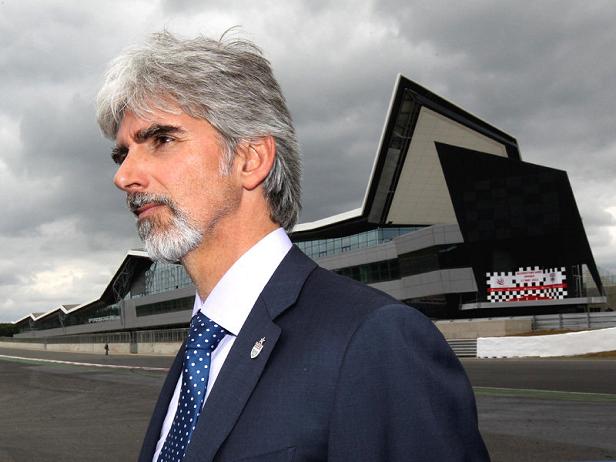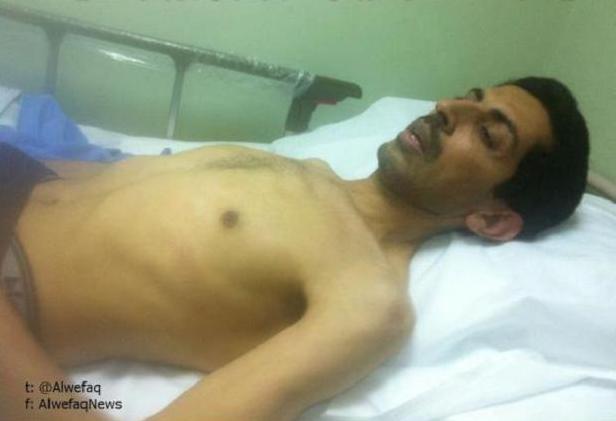F1 urged to rethink Bahrain GP, as hunger striker nears death Politics
New in Ceasefire, Politics - Posted on Friday, April 6, 2012 1:42 - 1 Comment
By John Lubbock
Formula One commentator, and 1996 world champion, Damon Hill. (Photo: David Davies/PA)
Yesterday’s media reports, suggesting that former Formula One world champion Damon Hill had changed his mind about the wisdom of bringing F1 back to Bahrain this month, after a year of unrest and human rights abuses, were yet another reminder that the Bahraini Spring was far from over. Hill was invited by the Bahrainis a few months ago so they could show him how everything was fine again, and he seemed to agree with them. Now after reading the latest reports, he has voiced fresh concern and said the Formula 1 authorities should think again.
The F1 Bahrain Grand Prix race, scheduled for 22 April, probably won’t get cancelled at such short notice, but if it goes ahead, there will likely be widescale repression going on behind the scenes to stop protesters getting anywhere near the racetrack. If anyone is killed as a result, it will be big news and bad for all Bahrainis. There is nothing in this to gloat about, but the Bahrain Centre for Human Rights has been warning of the possible consequences of holding the race since last year, and quite apart from this factor, it is just not right that a big international event should ignore ongoing human rights abuses and reward a dictator with such an important economic boon.
When I wrote an article with BCHR President Nabeel Rajab for The Guardian with our claims that staff at the Formula 1 circuit had been tortured on the premises by the chief of security, a PR firm immediately threatened legal action. We proved the claims to the satisfaction of The Guardian’s legal team and the PR firm backed down. It was yet another cowardly example of Bahrain’s rulers using their power to cow dissenting voices into silence. How many people did not give evidence to the Bahrain Independent Commission of Inquiry because they were threatened?
Bahrain’s government keeps on repeating its mantra that “reform” is taking place, that things will take time, but that things are getting better. They claimed that there were no more cases of torture after the publication of the BICI report. And yet, two people died from torture in January alone. The Foreign Minister has said ‘there is no political prisoner in Bahrain’, despite Abdulhadi Alkhawaja being on hunger-strike to protest his life sentence for 57 days now. If he dies, Bahrainis will take to the streets and there will surely be widespread violence, both from frustrated youths and from the security forces.
A look at the recommendations published in the BICI report, available on its website, shows most of them to have been “implemented”. Yet many haven’t. The report claims all cases of military prosecutions have been transferred to civilian court, yet 14 leading activists have not been retried in a civilian court. These are the same people, including Alkhawaja, who apparently don’t count as political prisoners. The government claims all charges relating to freedom of expression have been dropped, despite clearly not having done so. Indeed, Sir Nigel Rodley, one of the writers of the BICI report, has reiterated that they should be released.
The fact is that cosmetic changes are not going to solve the deeper problems in Bahraini politics. Bahrain’s government is like an alcoholic who keeps telling his family he will change, just so he can get them off his back and get back to drinking. All the PR and promises deployed by the Bahraini regime are directed at their international friends, who can’t afford embarrassing allies like them. The UK Foreign Office have told me they are angry that dates were not set for the retrial of the 14 opposition activists, and that the doctors are still being tried. In an absurd twist, the government produced a cache of weapons, including two AK47s, which it says the doctors somehow acquired to give to protesters. Foreign observers could not contain their hilarity and openly mocked these ridiculous charges in court with laughter.
Picture (released by his family) of Bahraini human rights activist Abdulhadi Al Khawaja as he enters the 58th day of his hunger strike (5 April 2012)
Last week, BCHR won the advocacy award at Index on Censorship’s 2012 London awards, with Nabeel Rajab delivering a great speech calling on activists to speak up about Western double standards when it comes to “our allies” in the Middle East. With very little money, BCHR has managed to raise the profile of Bahrain in the media, which even on our beloved ‘unbiased’ BBC is so often occupied by Kate Middleton, Syria and other UK foreign policy goals.
Yet Bahrain is so often lost amid the paranoia about Iran, and the desire not to upset our fundamentalist oil-rich Wahabi friends in Saudi Arabia, who always seem to get a free ride on human rights. The Saudis, by the way, are currently refusing to send women as part of their team to the Olympics, which will make them the only country still refusing to do so. Afghanistan was banned outright for this in 2000 and South Africa was banned during Apartheid despite offering to send black athletes.
The UK always reiterates that it is working behind the scenes, because we don’t use public sanctions with our allies, we just ask them nicely in private and if they refuse, then we smile politely and say ‘nevermind, next time maybe’. This week, the UK Foreign Office told me they were asking Bahrain to release Abdulhadi Alkhawaja for medical treatment to Denmark, where he holds citizenship. I have no idea what we are offering in exchange for them not letting him die, but this rather makes it seem like we are negotiating with terrorists holding a hostage, not one of our allies.
Whatever they are doing, they may be too late. A human being cannot survive without food for more than 65 days, and as Alkhawaja enters his 58th day (it is his 51st birthday today, which he has spent in military hospital), time is running very short. Family have released a picture of him in hospital, looking thin and frail. If he dies just weeks before the Formula 1 race, the consequences will be disastrous. I only hope that for all Bahrainis, the night is darkest before the dawn.
1 Comment
The Revolution Forgotten: #Bahrain and Abdulhadi Al-Khawaja’s Heroism





[…] also John Lubbock’s report: “F1 urged to rethink Bahrain GP, as hunger striker nears death” For updates and info please visit the Bahrain Centre for Human Rights […]